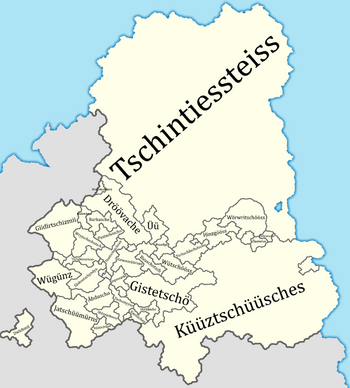Gintem Confederation: Difference between revisions
No edit summary |
No edit summary |
||
| Line 18: | Line 18: | ||
|alt_map = <!--alt text for map--> |
|alt_map = <!--alt text for map--> |
||
|map_caption = <!--Caption to place below map--> |
|map_caption = <!--Caption to place below map--> |
||
| − | |image_map2 = |
+ | |image_map2 = Gintem Confederation map.png <!--Another map, if required--> |
|alt_map2 = <!--alt text for second map--> |
|alt_map2 = <!--alt text for second map--> |
||
|map_caption2 = <!--Caption to place below second map--> |
|map_caption2 = <!--Caption to place below second map--> |
||
Revision as of 21:15, 8 December 2022
Gintem Confederation gen-she-den-rós-cin-de-den Genschedenrööss Hindeden | |
|---|---|
Motto: X | |
 | |
| Capital | X |
| Official languages | Tschintierst |
| Demonym(s) | Gintem |
| Government | Mixed confederal intergovernmental elective constitutional monarchy |
• X | Ytytschooryn Wechtachz |
| Legislature | United Council of the Various Lands of the Gintem Confederation |
| Noble Council | |
| Common Council | |
List of countries within the Gintem
| |
| Area | |
• | 699,902 km2 (270,234 sq mi) |
| This article is part of a series on |
| Gintem culture |
|---|
 |
| Countries |
| Languages |
| Religion |
| History |
| Culture |
| Related topics |
|
|
The Gintem Confederation is an association of 33 Tschintierst-speaking countries located in Northeast Yazland. The confederation covers and area of 699,902 km2 (270,234 sq mi) and has a combined population of X million people, not including overseas colonies of member states. The confederation has existed in some form since the fall of the Doccábhan Empire and Sendeasta Missísin’s division of its lands to the various Gintem tribal rulers. Since its formation the Gintem has been a powerful thorn in the side of various North Yazland nations, banding together to prevent any large scale outside attack, but constantly squabbling from within. The confederation is unique among organizations, being not a state, but also not a mere alliance; existing to mediate the various disputes between the rulers of the states that reside within it. In its modern form it has also served as a way to interact economically and politically with the various small states of the confederation without doing so individually, though states such as TSC and KSC still operate functionally independently of the confederation.

